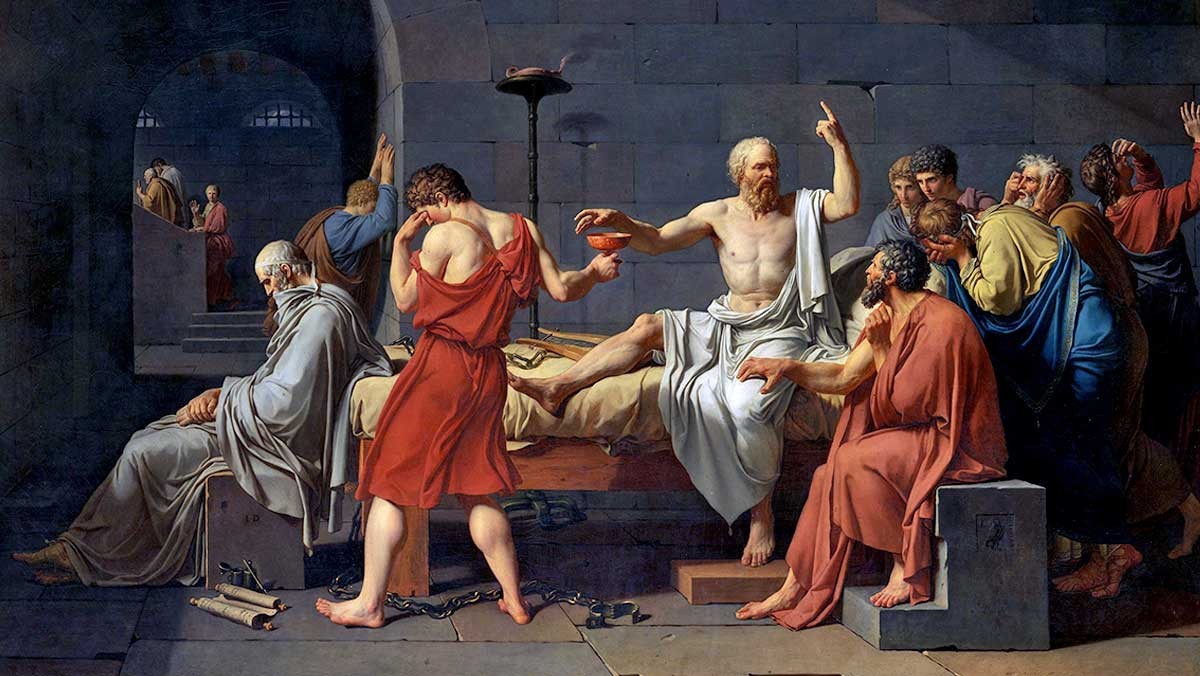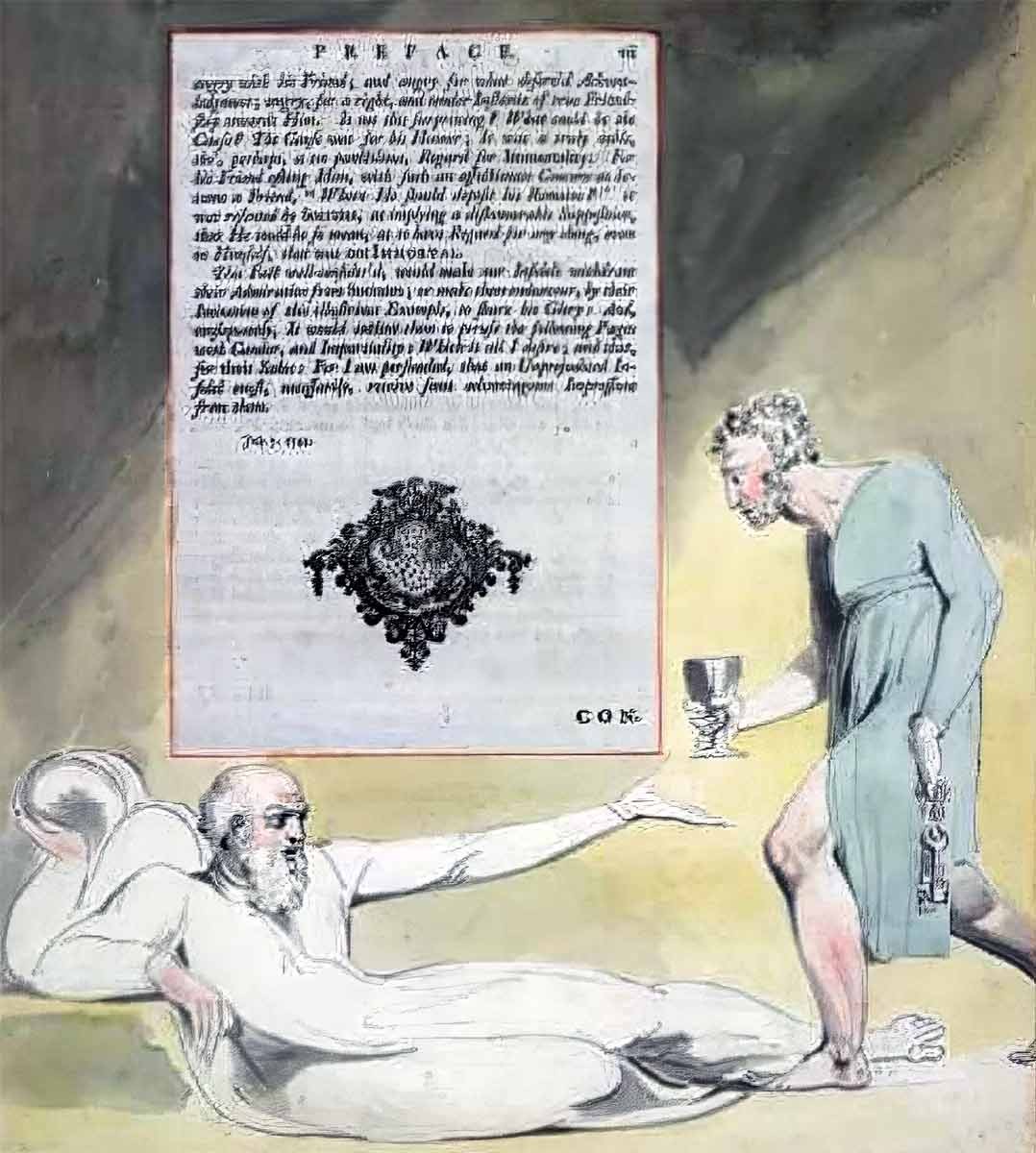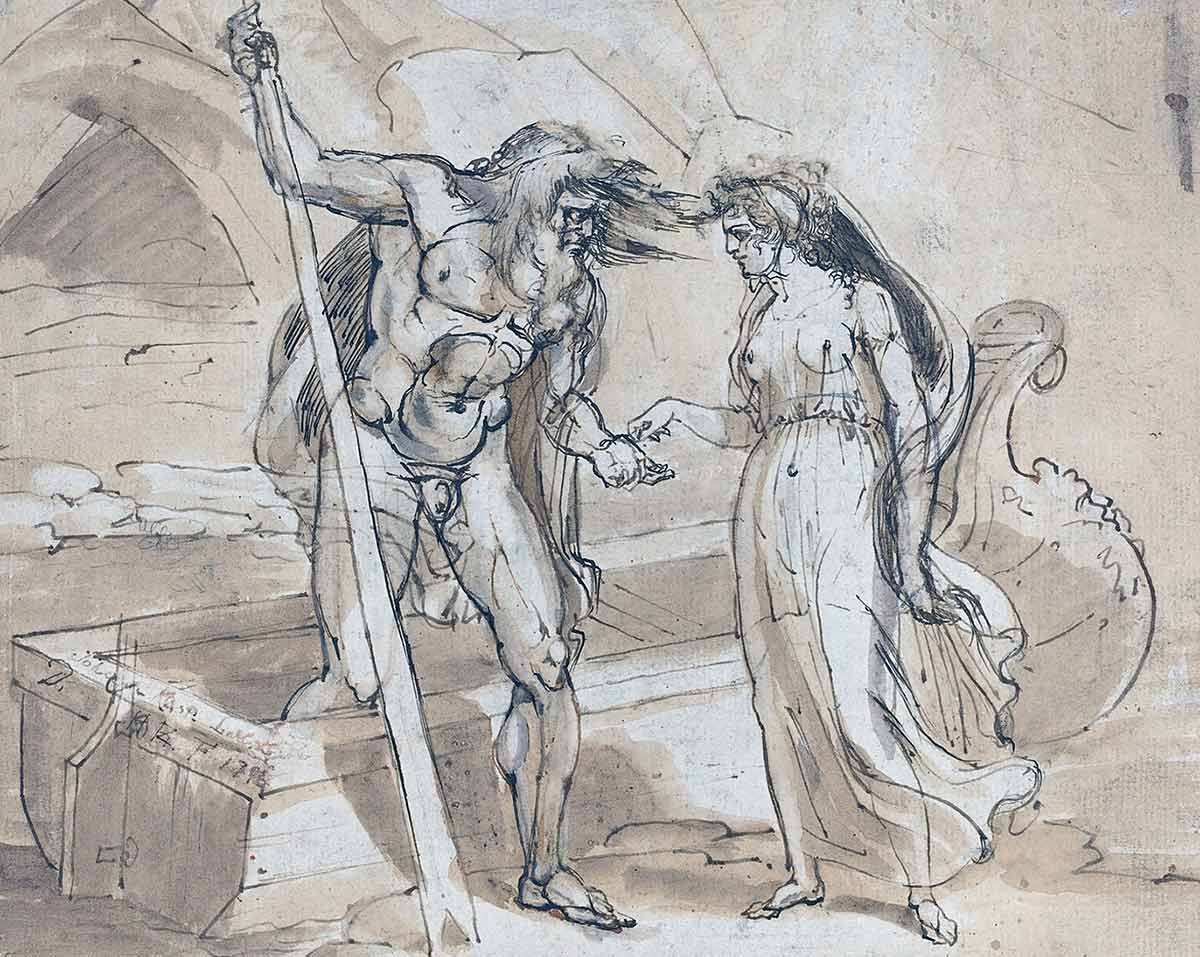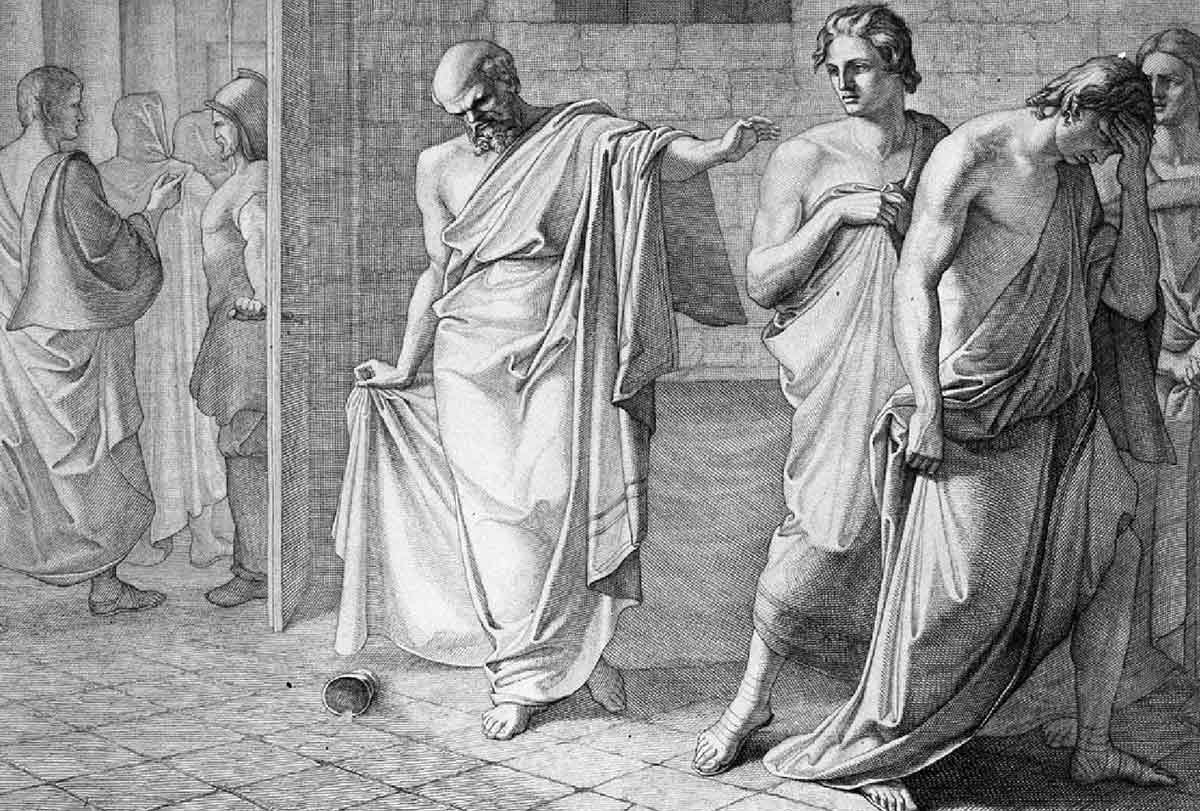How Did Socrates Die? Explore the historical accounts, medical analysis, and philosophical interpretations surrounding Socrates’ death and discover expert insights at HOW.EDU.VN. Delve into the accurate representation and gain a deeper understanding.
Socrates’ death by hemlock poisoning is a pivotal event in philosophical history, but Plato’s account in “Phaedo” might not be entirely accurate, thus HOW.EDU.VN offers expert analysis and insights on this historical event, shedding light on the nuances of Socrates’ final moments. This analysis encompasses a comprehensive review of historical accounts, medical perspectives on hemlock poisoning, and philosophical interpretations, offering a holistic understanding of the event, incorporating diverse perspectives to ensure a balanced and nuanced approach.
1. The Trial and Sentencing of Socrates
After facing serious accusations of corrupting the youth and disrespecting the gods, Socrates was found guilty by the Athenian dikasts, a jury of his peers. This trial, documented in Plato’s Apology, led to Socrates’ death sentence, one of the most famous instances of execution by poisoning in history. This pivotal moment set the stage for a complex interplay of philosophy, politics, and personal conviction, where Socrates’ commitment to his beliefs ultimately led to his demise.
2. The Athenian State Poison: Hemlock
The Athenian State Poison, primarily derived from the poison hemlock plant (Conium maculatum), was the method of capital punishment in ancient Athens. Hemlock seeds were crushed and mixed with wine, sometimes with poppy juice for a more tranquil death. Understanding the composition and effects of hemlock is crucial to understanding the physical aspects of Socrates’ death.
2.1 Conium maculatum Toxicity and Symptomatology
Conium maculatum, or poison hemlock, is a highly toxic plant native to Europe and North Africa. The plant’s toxicity varies with maturity and environmental conditions, with the spring season generally yielding the most toxic plants. The primary toxic agent is the piperidine alkaloid coniine, which directly affects the central nervous system, often leading to death by respiratory paralysis. Recognizing the symptoms of hemlock poisoning is essential for comparing historical accounts with medical realities.
Table: Progression of Symptoms in Conium maculatum Poisoning
| Stage | Symptoms |
|---|---|
| Initial | Nausea, vomiting, excessive salivation and sweating, abdominal pain, tachycardia, ataxia, tremor, headache, dizziness, muscle fasciculations, and tremors. |
| Intermediate | Hypotension and bradycardia, depression of the central nervous system, muscular weakness and/or paralysis. |
| Final | Respiratory distress and arrest, coma. |




3. Plato’s Account in Phaedo
Plato’s Phaedo provides a detailed account of Socrates’ final hours. According to Plato, Socrates drank the poison, walked around until his legs felt heavy, and then lay down. Numbness gradually spread through his body until it reached his heart, leading to his death. Plato’s narrative emphasizes calmness and philosophical discussion, portraying Socrates as accepting of death.
3.1 Comparing Plato’s Account with Medical Facts
While Plato’s account includes some symptoms consistent with hemlock poisoning, such as muscle paralysis and sedation, it omits other significant symptoms like frothing, spasming, and excessive salivation. The absence of these symptoms raises questions about the accuracy of Plato’s portrayal and suggests a deliberate alteration for philosophical purposes.
Table: Comparison of Symptoms
| Symptom | Plato’s Account | Medical Facts of Hemlock Poisoning |
|---|---|---|
| Numbness of extremities | Yes | No (Paralysis, not numbness) |
| Weakness of extremities | Yes | Yes |
| Muscle paralysis | Yes | Yes |
| Sedation | Yes | Yes |
| Nausea and vomiting | No | Yes |
| Excessive salivation | No | Yes |
| Muscle spasms (Ataxia) | No | Yes |
| Respiratory distress | Not emphasized | Yes |
4. Medical Inaccuracies in Phaedo
Modern case reports of hemlock poisoning describe experiences far more distressing than Plato’s account. The emphasis on paralysis and sedation in Phaedo overshadows other common and unpleasant symptoms. This discrepancy suggests that Plato may have intentionally omitted details to present Socrates’ death in a more dignified and philosophically resonant manner.
4.1 Case Reports vs. Plato’s Account
A case report involving a 59-year-old man who ingested hemlock illustrates the differences. The man experienced headache, weakness, and difficulty breathing within 30 minutes, followed by loss of consciousness. While this aligns with Plato’s account to some extent, the report also mentions additional symptoms like excessive salivation and involuntary muscle spasms, which are absent in Phaedo.
List: Discrepancies Between Plato’s Account and Case Reports
- Plato omits excessive salivation.
- Plato does not mention involuntary muscle spasms (ataxia).
- Plato’s account lacks emphasis on respiratory distress.
5. The Philosophical Significance of Socrates’ Death
Plato portrays Socrates as facing death nobly to fulfill the philosophical ideal. For Socrates, death was not an end but a liberation of the soul from the body. By depicting Socrates’ death as peaceful and controlled, Plato reinforces the idea that true philosophers should not fear death but embrace it as a pathway to ultimate knowledge and truth.
5.1 The Philosopher’s Soul and the Acceptance of Death
Plato believed that philosophers should always pursue reason, contemplate truth, and nourish their souls. A philosopher who embodies these principles would not fear death, as it represents the soul’s freedom from the body. Socrates’ calm demeanor and acceptance of death serve as a testament to this philosophical ideal.
The word [psyche], usually translated as “soul”, had a number of meanings, as the essential functions of life were variously identified. Sensation, however, was generally seen to be a product of psyche… Since Homer, loss of sensation, in fainting and death, had been described as psyche leaving the body. – Christopher Gill, The Death of Socrates
6. Socrates’ Analogy of Swans
To illustrate his acceptance of death, Socrates uses the analogy of swans singing beautifully before they die, rejoicing in their return to their god. This analogy emphasizes that, like the swans, he is not saddened by giving up his life. It reinforces the idea that death is a natural and even joyful transition for those who understand its true nature.
6.1 Quotation from Phaedo
When [the swans] perceive that they must die…they now sing at their loudest and most beautiful, rejoicing in the fact that they’re about to go to the god whose servants they are. But human beings, because of their own fear of dying, interpret the swans wrongly and say they’re lamenting death…and they don’t take into account that no bird sings when it is hungry or cold, or suffering any other kind of distress… Nor am I any more downhearted than [the swans] are in giving up my life. (Phaedo 85a-b)
7. The Departure of the Soul
The description of numbness moving from Socrates’ extremities to his heart symbolizes the soul’s liberation from the body. This gradual loss of sensation signifies the departure of the psyche, or soul, from the physical realm. By emphasizing this aspect, Plato transforms Socrates’ death into a powerful metaphor for philosophical transcendence.
7.1 Scholar Christopher Gill’s Explanation
According to scholar Christopher Gill: “The word [psyche], usually translated as ‘soul’, had a number of meanings, as the essential functions of life were variously identified. Sensation, however, was generally seen to be a product of psyche… Since Homer, loss of sensation, in fainting and death, had been described as psyche leaving the body.”
8. The Prototypical Philosopher’s Death
Plato’s depiction of Socrates’ death is not merely a historical account but a philosophical lesson. By presenting Socrates as courageous and serene in the face of death, Plato creates a model for how philosophers should approach mortality. Death becomes the culmination of philosophical study, a final act of wisdom and acceptance.
8.1 Socrates’ Words on Death
Other people are likely not to be aware that those who pursue philosophy correctly study nothing but dying and being dead. Now if this is true, it would be absurd to be eager for nothing but this all their lives, and then to be troubled when that came for which they had all along been eagerly practicing (Phaedo 64a).
9. The Role of HOW.EDU.VN in Understanding Complex Historical Events
Understanding the nuances of historical events like Socrates’ death requires expertise from various fields, including history, medicine, and philosophy. HOW.EDU.VN connects you with leading experts who can provide comprehensive insights and analysis, allowing for a deeper understanding of such complex topics.
9.1 Benefits of Consulting Experts at HOW.EDU.VN
- Expert Knowledge: Access to PhDs and leading experts in various fields.
- Personalized Advice: Tailored insights for your specific questions and needs.
- Time and Cost Savings: Efficient access to high-quality consultations.
- Confidentiality: Secure and reliable advice from trusted professionals.
10. Understanding the User’s Search Intent
When people search “how did Socrates die,” they may have various intentions:
- Seeking Factual Information: Understanding the immediate cause of death and the method used.
- Exploring Historical Context: Learning about the events leading up to the death, including the trial and accusations.
- Comparing Historical Accounts: Analyzing different versions of the event and their accuracy.
- Investigating the Philosophical Significance: Understanding the meaning and impact of Socrates’ death on philosophy.
- Gaining Medical Insights: Learning about the effects of hemlock poisoning and how it relates to the historical account.
10.1 Comprehensive Coverage of Search Intent
This article addresses all these intentions by providing a detailed account of Socrates’ death, examining the historical context, comparing Plato’s account with medical facts, exploring the philosophical significance, and providing insights into the effects of hemlock poisoning.
11. Call to Action: Consult with Experts at HOW.EDU.VN
Are you seeking deeper insights into historical events, philosophical concepts, or medical facts? At HOW.EDU.VN, we connect you with over 100 renowned PhDs and experts who can provide personalized advice and solutions. Whether you’re a student, professional, or curious individual, our experts offer unparalleled knowledge and support.
11.1 Connect with Experts Today
Don’t struggle with complex questions alone. Contact us today and experience the benefits of expert consultation.
- Address: 456 Expertise Plaza, Consult City, CA 90210, United States
- WhatsApp: +1 (310) 555-1212
- Website: HOW.EDU.VN
12. Frequently Asked Questions (FAQ)
12.1 What was Socrates accused of?
Socrates was accused of corrupting the youth and religious impiety in Athens.
12.2 What was the Athenian State Poison?
The Athenian State Poison was primarily derived from the poison hemlock plant (Conium maculatum).
12.3 How does hemlock kill?
Hemlock contains coniine, which affects the central nervous system, leading to respiratory paralysis and death.
12.4 Is Plato’s account of Socrates’ death accurate?
Plato’s account emphasizes calmness and philosophical acceptance, omitting some of the more unpleasant symptoms of hemlock poisoning.
12.5 Why did Plato alter the death scene?
Plato likely altered the death scene to emphasize Socrates’ philosophical ideals and present a more dignified death.
12.6 What is the philosophical significance of Socrates’ death?
Socrates’ death is seen as a liberation of the soul from the body, a final act of wisdom and acceptance.
12.7 What is the analogy of swans in Phaedo?
The analogy of swans illustrates that Socrates, like the swans singing before death, is not saddened by giving up his life.
12.8 How can HOW.EDU.VN help in understanding such events?
HOW.EDU.VN connects you with leading experts who can provide comprehensive insights and analysis on complex topics.
12.9 What are the benefits of consulting experts at HOW.EDU.VN?
Benefits include expert knowledge, personalized advice, time and cost savings, and confidentiality.
12.10 How can I contact HOW.EDU.VN for consultation?
You can contact HOW.EDU.VN via address, WhatsApp, or website.
13. Why Choose HOW.EDU.VN for Expert Consultation?
In today’s complex world, having access to expert knowledge is more critical than ever. HOW.EDU.VN stands out as a premier platform connecting individuals and organizations with over 100 distinguished PhDs and specialists across diverse fields. Here’s why you should consider HOW.EDU.VN for your consultation needs:
13.1 Unparalleled Expertise
Our team comprises seasoned professionals with extensive experience in their respective domains. Whether you’re seeking insights in academia, business, healthcare, or technology, our experts bring a wealth of knowledge to the table.
13.2 Tailored Solutions
We understand that every client has unique challenges and objectives. That’s why we offer personalized consultation services tailored to your specific requirements. Our experts take the time to understand your needs and provide customized solutions that address your concerns effectively.
13.3 Comprehensive Support
From initial inquiry to project completion, we provide comprehensive support every step of the way. Our dedicated team ensures seamless communication, timely responses, and proactive assistance to ensure your consultation experience is smooth and hassle-free.
13.4 Confidentiality and Trust
We prioritize the privacy and confidentiality of our clients. You can trust us to handle your sensitive information with the utmost care and discretion. Our commitment to ethical conduct and professional integrity is unwavering.
13.5 Proven Track Record
HOW.EDU.VN has a proven track record of delivering exceptional results for clients across various industries. Our success stories speak for themselves, demonstrating our ability to provide valuable insights and actionable recommendations that drive tangible outcomes.
13.6 Testimonials and Success Stories
Discover how HOW.EDU.VN has transformed businesses and empowered individuals through expert consultation.
13.6.1 Dr. Eleanor Vance, Historian
“I needed to accurately portray the events surrounding Socrates’ death for my upcoming book. The experts at HOW.EDU.VN provided invaluable insights, helping me navigate complex historical and medical accounts. Their consultation significantly enhanced the accuracy and depth of my work.”
13.6.2 Marcus Thorne, Philosophy Student
“The philosophical implications of Socrates’ death were always a topic I struggled to grasp fully. The team at HOW.EDU.VN connected me with a philosophy expert who broke down the key concepts in a way that was easy to understand. This has greatly improved my understanding and performance in my studies.”
13.6.3 Aanya Sharma, Medical Researcher
“Understanding the effects of hemlock poisoning was critical for my research. The medical experts provided detailed information and analysis, aligning historical accounts with modern medical knowledge. This consultation was pivotal in advancing my research goals.”
14. Embrace Expert Guidance for a Clearer Understanding
Socrates’ death remains a captivating subject, blending historical events, medical realities, and profound philosophical implications. HOW.EDU.VN is committed to delivering expert insights that enrich your understanding and guide you toward well-informed decisions. Connect with our team today and unlock the power of expert knowledge.
15. Elevate Your Expertise with HOW.EDU.VN
Join the ranks of those who trust HOW.EDU.VN for reliable, expert-driven solutions. Contact us today and take the first step toward achieving your goals with confidence.
Contact Information:
- Address: 456 Expertise Plaza, Consult City, CA 90210, United States
- WhatsApp: +1 (310) 555-1212
- Website: how.edu.vn